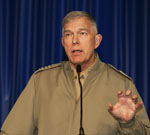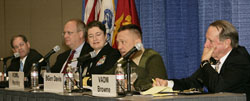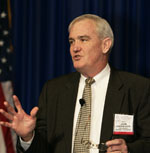Quote of the Day: “It's not a war that we can win as a coalition—it's a war that must be won by moderate Muslims.”—Gen. James T. Conway, USMC, commandant of the Marine Corps, on the Global War on Terrorism
West 2008 Online Show Daily
Day 3
By Robert K. Ackerman
 |
| Gen. James T. Conway, USMC, commandant of the Marine Corps, speaker at the Fast-track Breakfast Address on the final day of West 2008. |
Everyone—soldiers, sailors, airmen, Marines and civilians—is a combatant in the Global War on Terrorism. While military personnel take the fight to the enemy overseas, civilians on the home front have their own duties to deny success to extremist evildoers.
That message was hammered home by speakers and panelists on the final day of West 2008, the annual conference and exposition sponsored by AFCEA International and the U.S. Naval Institute. Discussion points ranged from how the services face challenges adapting to this new type of warfare, to how commercial capabilities and technologies affect homeland security.
One panelist even offered that the
Gen. James T. Conway, USMC, Marine Corps commandant, characterized the Global War on Terrorism as far-reaching and long-term.
Gen. Conway cited progress in
The fight in
 |
| Information security and cyberwar were the topics covered by a panel comprising (r to l) moderator Vice Adm. Herbert A. Browne, USN (Ret.), former deputy commander, U.S. Space Command and former AFCEA CEO; Brig. Gen. Jon Davis, USMC, deputy commander, Joint Functional Component Command (network warfare), U.S. Space Command; Rear Adm. Janice Hamby, USN, director of global operations (N3), Naval Network Warfare Command; David Wennergren, deputy assistant secretary of defense and deputy CIO; and Steve Cooper, former chief information officer, Department of Homeland Security. |
And, the Corps’ expeditionary nature is in need of a boost. Gen. Conway warned that the Corps has an entire generation of Marines who are combat-hardened but never have set foot on a ship. The Corps is losing expertise and is becoming “out of whack” with its expeditionary nature, he charged. They have become land warriors, and they need to get back to a lighter, faster Marine Corps.
The relationship between the Marine Corps and industry is pretty good, the general allowed. Two things sit atop the Marine Corps’ wish list: a way to defeat improvised explosive devices, and a new helmet that can stop a 7.62-millimeter round that is the favorite of enemy snipers. Gen. Conway also called for the development of asymmetric ways of countering the enemy’s own asymmetric warfare tactics.
Technology, particularly from the commercial sector, will be one of the key tenets in the strategy to defeat terrorism, said a former U.S. Army general now working for the world’s largest software company. Lt. Gen. John M. McDuffie, USA (Ret.), vice president, U.S. Public Sector, Microsoft Corporation, said that technology standards are key to an enterprise as large as the Defense Department, and much remains to be done in that arena.
 |
| Lt. Gen. John M. McDuffie, |
For future technologies, visualization tools will evolve and change everyone’s lives, Gen. McDuffie predicted. Coupling geospatial technologies with simulation will lead to incredible capabilities. Parallel computing holds great promise for solving the problem of excessive heat generation from increasingly dense processors.
However, the
—Plan now for West 2009, to be held February 10-12 in
Full coverage of West 2008 can be read in the April 2008 issue of SIGNAL Magazine.




Comments